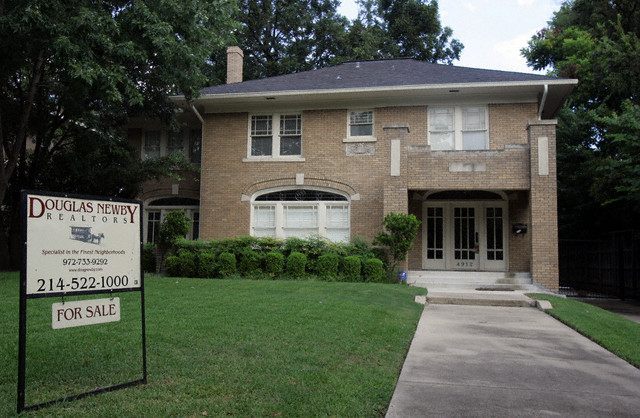Standard & Poors (S&P) Dow Jones Indices released the latest results of their Case-Shiller Composite of 20 Home Price Index, the yardstick of US home prices, on May 26. The data showed that the Dallas-Fort Worth (DFW) real estate market is red hot: home prices jumped 9.3 percent, twice the national average of 4.1 percent. Only San Francisco at 10.3 percent and Denver, at 10 percent, rose faster.
This unprecedented spike in North Texas home prices over the past two years is “more than the twice the long term-average rate,” according to the Dallas Morning News.
Analysts attribute the soaring sticker shock of home prices to strong economic growth throughout the region, coupled with a short supply of inventory for sale. Much of the DFW housing boom appears to be driven by newer populations, including the swell of corporations pouring into North Texas. Between 2010-14, the DWF Metropolitan Statistical Area (MSA) grew by approximately 528,000, to around 7 million people.
As with any boom, however, the concern is a potential bust. S&P’s David Blitzer said in the Case-Shiller report, “Given the long stretch of strong reports, it is no surprise that people are asking if we’re in a new home price bubble.”
He highlighted a troubling reality: “Home prices are currently rising more quickly than either per capita personal income (3.1 percent) or wages (2.2 percent) narrowing the pool of future home-buyers.”
Blitzer suggested that “future moderation in home prices gains is likely,” but he predicted the market was solvent and would not crash at a later date. “I would describe this as a rebound in home prices, not a bubble and not a reason to be fearful,” he said.
Last winter, Fitch Ratings saw the market climate a little differently, warning that Texas had the most overvalued home prices in the nation. In December, they anticipated a market correction based on falling oil prices, although local analysts such as economist Jim Gaines, with the Real Estate Center at Texas A&M University, disagreed with Fitch’s findings.
“I’m not buying the overvalued card right now,” Gaines told the Dallas Morning News, although he did agree that home prices have “increased substantially for Texas markets,” qualifying that they had been “essentially flat for almost five years.”
Fitch saw Texas home prices as approximately 11 percent overvalued, with prices in Houston, Austin, and Dallas each growing by over 20 percent since 2011. The ratings firm said that the Lone Star State “vaulted past California and now has the housing markets deemed most overvalued.”
According to Case-Shiller, DFW home prices this year are at all-time record highs – more than 15 percent higher than at the peak of the housing market, before the recession.
Nationally, prices are still almost 10% below the high set in July 2006. In the Dallas and Fort Worth metropolitan complex (“metroplex”) and their outlying regions, home values are rising at a faster rate than incomes, potentially pricing many would-be buyers out of the market, according to the Ft. Worth Star-Telegram.
Buyers have less inventory to choose from, which often sparks bidding wars. Analysts determine a top market based on demand for its housing and how long it takes to sell a property. In April, the median age a home sale took in the Metroplex was 39 days; in March, it took 52 days, according to the National Association of Realtors. The national average is 103 days.
Although Waco did not appear in the top 20 list, it was evaluated as a white hot-market due to a great deal of online real estate activity, noted Culture Map Dallas.
Home sales across the North Texas region were up 4 percent in April 2015 from a year ago. Realtor.com economist Jonathan Smoke said Dallas was “definitely not slowing down.”
Home prices are expected to continue to increase in the DFW at close to a 10 percent annual rate through the rest of this year and into 2016, says the Dallas Morning News.
Conversely, San Diego, Las Vegas, and Portland lagged in the market. According to Realtor.com, Las Vegas home prices tumbled more than any other city during the housing market collapse, resulting in a nearly 62 percent drop in value. The Case-Shiller composite has them currently at 41 percent below that peak.
In early May, Realtor.com named DFW the hottest housing market in the country. Those figures were calculated based on the top markets in April, the demand for housing, and how long it took to sell a property, according to the Dallas Morning News.
Realtor.com tracks real estate trends nationally. They also ranked the Lone Star State second on their “mom state” scale of areas boasting the greatest number of households that include mothers and children under 18.
Montague County in North Texas, which borders Oklahoma, received high marks for “giving kids an economic chance for success.”
The “mom list” is headed by Utah. Georgia placed third, while California rounded out the top four.
The Case-Shiller 20-City Composite metro areas included Atlanta, Boston, Charlotte, Chicago, Cleveland, Dallas, Denver, Detroit, Las Vegas, Los Angeles, Miami, Minneapolis, New York, Phoenix, Portland, San Diego, San Francisco, Seattle, Tampa, and Washington, DC.
Follow Merrill Hope at Twitter @OutOfTheBoxMom.

COMMENTS
Please let us know if you're having issues with commenting.